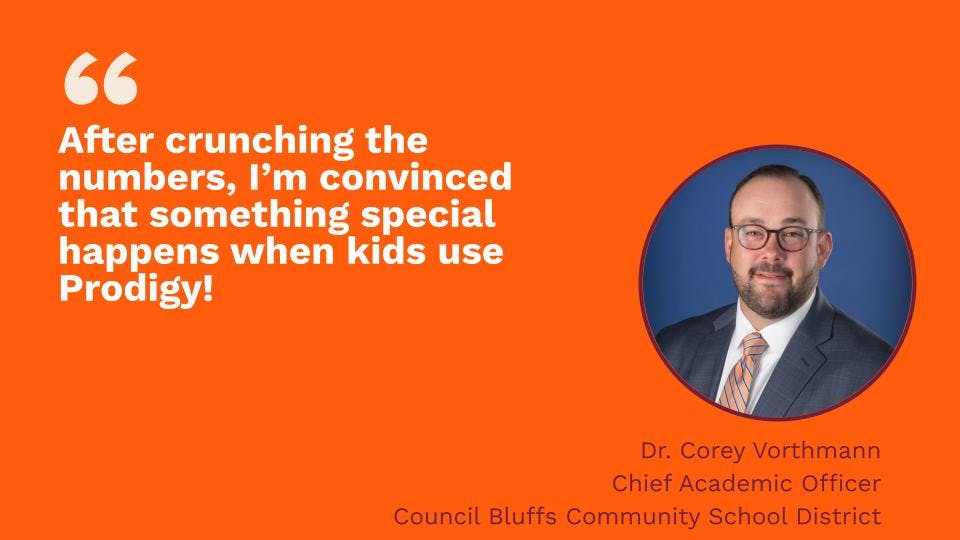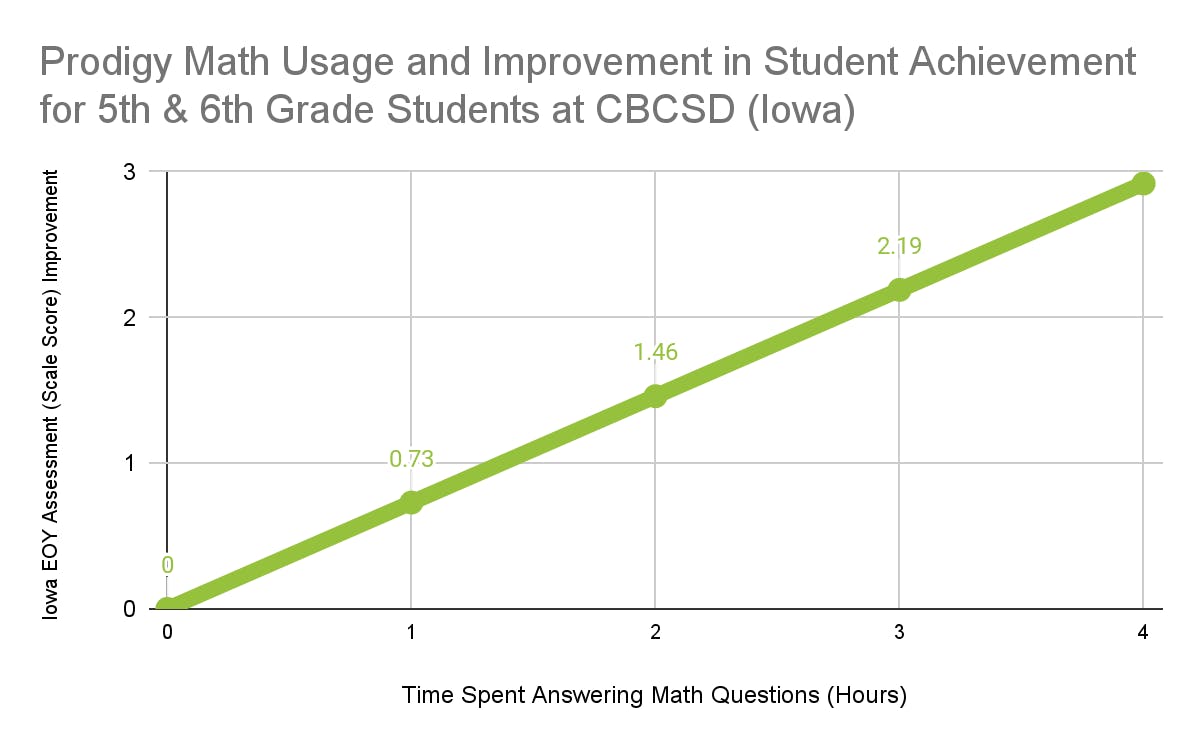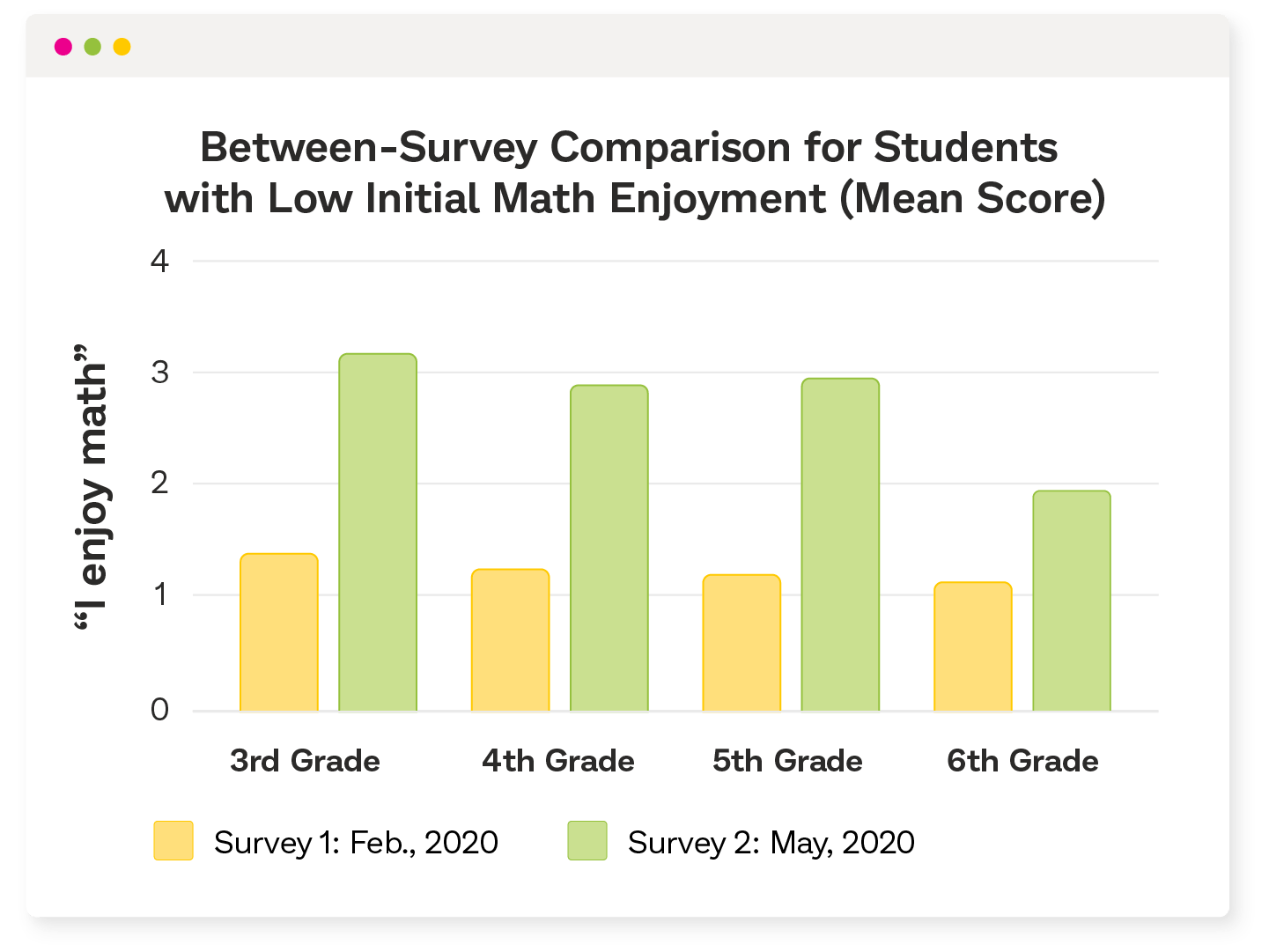Does Prodigy Work? Check Out The Evidence!

At Prodigy Education, our mission is to help every student in the world love learning. We pride ourselves on creating products that are aligned with our five brand pillars: personalized, engaging, accessible, sustainable and effective.
Through our philosophy of education, “Motivation First!,” we are committed to delivering a fun and engaging game-based learning experience, informed by academic research, to increase the likelihood of student success.
Several studies have shown a correlation between the amount of use of Prodigy Math and positive academic outcomes.[1] This correlation has led Prodigy Math to meet the criteria for the Every Student Succeeds Act (ESSA), Tier 3, including this independent evaluation. But that’s not all!
Here at Prodigy Education, we’re also keen on helping nurture a positive attitude towards math. In this study, we found correlational evidence that students’ attitudes towards math can shift to a positive direction over time while using Prodigy Math.[2]
Read on to find out more about the research we’ve done!

Prodigy Math: A closer look at design and outcomes
Research on academic outcomes
A technical white paper, co-authored in 2022 by district-level leaders at Council Bluffs Community School District (CBCSD) and researchers at Prodigy Education, included two research studies that found:
- High levels of Prodigy Math usage among CBCSD elementary school students from 1st to 4th grade (2,645 students) during the 2020–21 school year had a potentially positive effect on NWEA (Northwest Evaluation Association) MAP® achievement improvement.[3]
- For each additional hour CBCSD students in 5th and 6th grade spent answering math questions on Prodigy Math, the students would on average score 0.73 points higher on the Iowa end-of-year assessment scale score when looking at data from both 2018–19 and 2020–21.[3]

In an independent analysis commissioned by Prodigy Education, Prodigy Math was evaluated by independent researchers at a leading educational research institution. The study identified Prodigy Math as having met the criteria for ESSA, Tier 3. View the key findings and the full report.

Research on attitudinal outcomes
We’re making a concerted effort to understand whether or not Prodigy Math can help improve students’ attitudes towards math, such as math enjoyment and math perseverance. The outcomes we have seen to date are exciting!
In a 2021 survey sent to parents, and that included over 1,000 respondents, researchers at Prodigy Education discovered that nearly three-quarters of the parents surveyed chose Prodigy Math over other educational products because Prodigy Math has strong, research-based evidence of impact on student learning. Some additional findings from this survey outlining parents’ sentiments towards the impact of Prodigy Math include:
- Two-thirds of the parents surveyed said that their child’s level of math confidence has increased since using Prodigy Math.
- Approximately two-thirds of the parents surveyed said that their child’s math perseverance has increased since using Prodigy Math.
- Among parents surveyed who said that their child previously exhibited math anxiety, more than seven in 10 parents said that their child’s level of math anxiety has decreased since using Prodigy Math.[4]
- Nearly seven in 10 parents surveyed said that their child’s sense of achievement in math has increased since using Prodigy Math.
In a study dedicated to math enjoyment, researchers at Prodigy Education reviewed survey data from 1,912 students in 3rd through 6th grade.[5] For students who reported low math enjoyment in an initial survey, we observed a significant increase in math enjoyment in the second survey which occurred just a few months later—as they were continuing to use Prodigy Math.[1]

For students (n = 230) who gave a low score for “I enjoy math” in Survey 1 (mean = 1.24), there was a significant increase in their Survey 2 score (mean = 2.89).
Other notable findings from parents and teachers
At Prodigy Education, one of our cultural values is being “user obsessed” and that’s why we’re continuously checking with parents and teachers to understand their level of satisfaction with the educational impact of Prodigy Math. Here are just some of our results from surveys conducted in 2021:
- 96% of parents and teachers surveyed were satisfied with the educational impact of Prodigy Math.[6]
- Nearly eight in 10 parents surveyed said that their child’s math learning has accelerated since using Prodigy Math.[7]
- Nearly seven in 10 parents surveyed said that Prodigy Math has helped their child get up-to-speed on critical math knowledge for school.[8]
As part of a school and district support program, the Prodigy Education team interviewed personnel at schools and districts from across the United States such as Haralson County School District (Georgia), Fullerton School District (California), and Distinctive Schools (Illinois), we heard incredible stories about the positive impact Prodigy Math can have on students.
Mackenzie Beisser, a 6th grade special education teacher at Distinctive Schools shares how Prodigy helped her students:
“With my group of diverse learners—typically those that struggle with motivation and independent functioning—I see a high level of engagement. With most other things there’s reluctance, and they definitely are more engaged with Prodigy.”
Prodigy English: How research informed our newest product
Research-based design
We are delighted to be releasing Prodigy English! We have compiled all that we have learned from Prodigy Math and have applied it to Prodigy English. This means that, like Prodigy Math, Prodigy English has been designed with research-based best practices in mind right from the start!
We have published an article and a comprehensive report outlining the research that underpins Prodigy English to help let the world know that we care about the educational impact of our new products just as much as we care about our existing ones. As a result of this work and the plan to conduct research on the impact of Prodigy English, we are excited that Prodigy English meets the criteria for the Every Student Succeeds Act (ESSA), Tier 4.

Take the next step with Prodigy Education!
Now you know more about the positive impact that Prodigy Math has on student achievement and students’ attitudes, as well as the research that underpins the design of Prodigy Math and Prodigy English. Take the next step in your child or students’ learning journey with Prodigy Education by registering for a parent or teacher account today!
[1] Findings are correlational, not causal. Individual results may vary. Results are not guaranteed.
[2] Responding to questions was/is optional for students. All data is anonymized and aggregated. No personally identifiable information (PII) was collected from students during this process. Findings are based on responses to questions at the time. Individual circumstances may vary. Results are not guaranteed.
[3] Based on 5th and 6th grade students’ use in one district in Iowa. Findings are correlational, not causal. Individual results may vary. Results are not guaranteed. Rate of diminishing returns is unknown.
[4] Parents need to have answered yes to the qualifying question: “Before using Prodigy Math Game, did your child exhibit anxiety towards math?” Of the 1,053 respondents to this question, 326 answered yes. The statistic provided is based on the responses of the 326 parents who answered yes to the qualifying question, and then rated their child’s decreasing level of math anxiety after using Prodigy Math in a follow-up question.
[5] Responding to questions was/is optional for students. All data is anonymized and aggregated. No personally identifiable information (PII) was collected from students during this process. Findings are based on responses to questions at the time. Individual circumstances may vary. Results are not guaranteed.
[6] Number of respondents to this question is 2,217.
[7] Number of respondents to this question is 1,151.
[8] Number of respondents to this question is 1,126.



